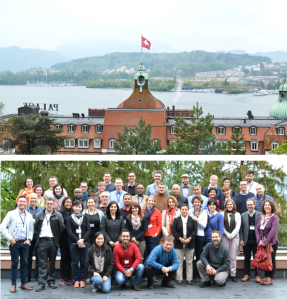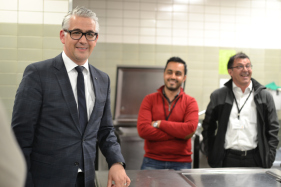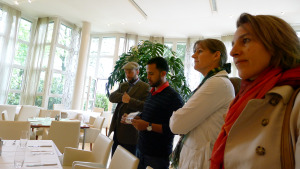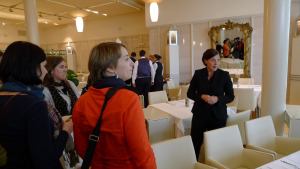Tuesday 28.04.2015
Joint visit (PSD/FSD Group and VSD Group) to Swiss Hotel Management Academy Lucerne (SHL), in Lucerne
The aims of these field visits are to get to know Swiss private companies and institutions and their way of working in the gastronomy/tourism sector, to learn about ongoing collaborations between SDC and SHL in Myanmar, and to get inspired by models that may be adapted in the participants’ own work context.
 Timo Albiez (SHL) first presents the SHL, a kind of public-private partnership with business associations and public authorities, partnering to offer excellent, internationally renowned training for the tourism industry. The SHL was founded in the early 20th century to provide the Swiss hotels with skilled local staff. Today it educates 220 students. An increasingly important sector for SHL is the healthcare and hospital industry, as hospitality becomes a more and more important issues for Swiss first class hospitals.
Timo Albiez (SHL) first presents the SHL, a kind of public-private partnership with business associations and public authorities, partnering to offer excellent, internationally renowned training for the tourism industry. The SHL was founded in the early 20th century to provide the Swiss hotels with skilled local staff. Today it educates 220 students. An increasingly important sector for SHL is the healthcare and hospital industry, as hospitality becomes a more and more important issues for Swiss first class hospitals.
Most students start SHL at the age of 20, they can obtain an officially recognized diploma if they successfully pass all five semesters. Already in the first semester the students work in the school’s kitchen and get in contact with all professions related to the hotel business, even slaughtering. Several internships are part of the curricula. The students choose their own internship locations; at least one of them has to be in a foreign country. Before the final semester the students have to acquire some professional expertise in a “real” job.
 Since 2014 SHL is member of a consortium implementing the SDC-financed “Vocational Skills development programme (VELA)” in Myanmar.
Bart Ferwerda (SHL) presents some key features of the programme, consisting of three project components: the Hospitality Training Initiative, local Vocational Training at village level, and support to the National Skills Standards Authority. The SHL plays an important role in training and certification of the programme’s 18 master instructors. These need to have English language knowledge, working experience at supervisory or management level and IT skills.
Since 2014 SHL is member of a consortium implementing the SDC-financed “Vocational Skills development programme (VELA)” in Myanmar.
Bart Ferwerda (SHL) presents some key features of the programme, consisting of three project components: the Hospitality Training Initiative, local Vocational Training at village level, and support to the National Skills Standards Authority. The SHL plays an important role in training and certification of the programme’s 18 master instructors. These need to have English language knowledge, working experience at supervisory or management level and IT skills.
 SHL is also directly involved in the development of curricula for the hospitality instructors which are then certified by Swisscontact. The 3500 learners of VELA however are entirely selected by Swisscontact. During their training they are attached to a hotel for seven weeks.
Carin Salerno of SDC Myanmar underlines the importance of the tourism industry for economic development in Myanmar. This particular collaboration with local three and four-star hotels (where the training takes place) is seen as an innova
SHL is also directly involved in the development of curricula for the hospitality instructors which are then certified by Swisscontact. The 3500 learners of VELA however are entirely selected by Swisscontact. During their training they are attached to a hotel for seven weeks.
Carin Salerno of SDC Myanmar underlines the importance of the tourism industry for economic development in Myanmar. This particular collaboration with local three and four-star hotels (where the training takes place) is seen as an innova tive approach in this context. Due diligence is however very important as to avoid collaborating with hotels that are owned by cronies. It will be very interesting to see if this project can prove its sustainability and the ownership for the trainings can be passed over to the local hotels (and/or SHL) one day.
tive approach in this context. Due diligence is however very important as to avoid collaborating with hotels that are owned by cronies. It will be very interesting to see if this project can prove its sustainability and the ownership for the trainings can be passed over to the local hotels (and/or SHL) one day.
The visit ends with an apéro and a guided tour where we can see the school’s students at work.
